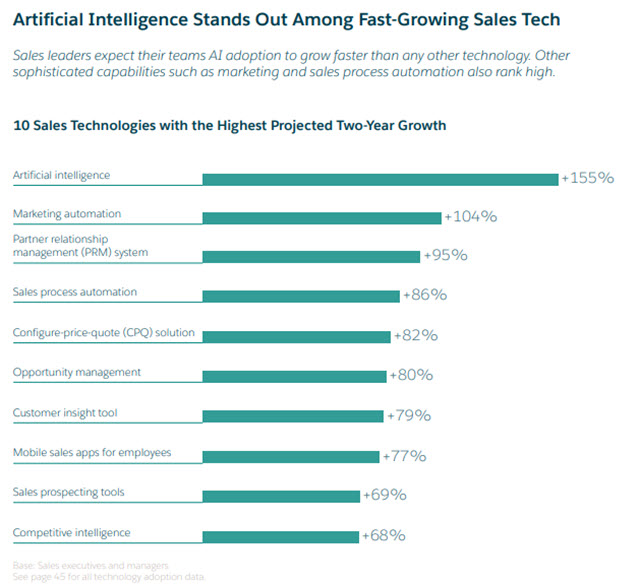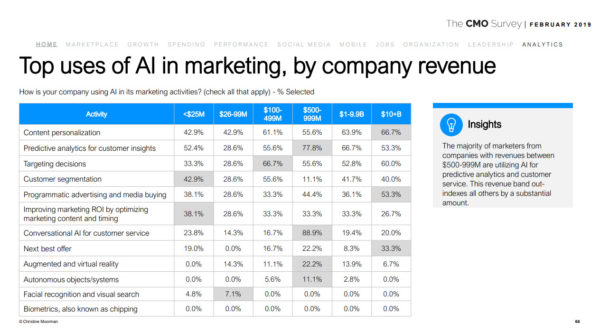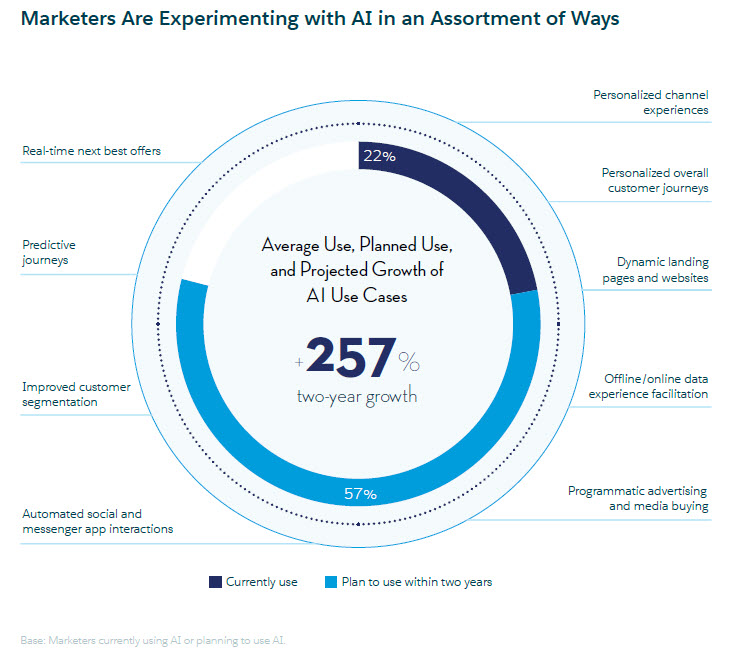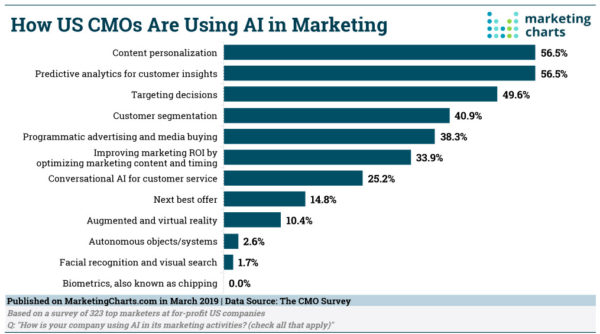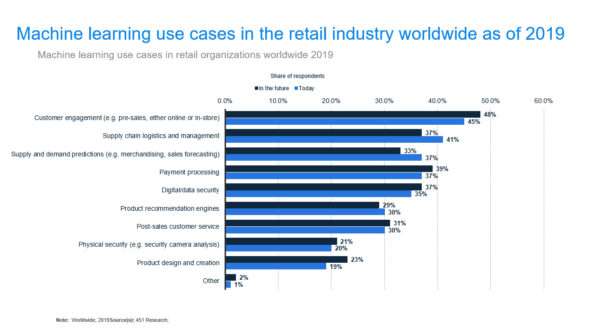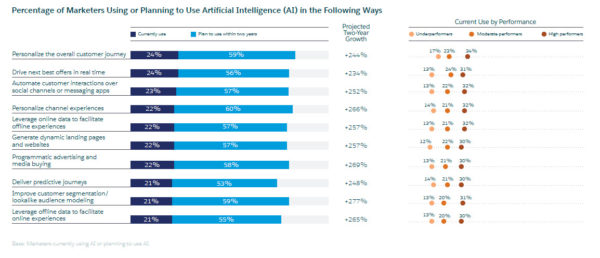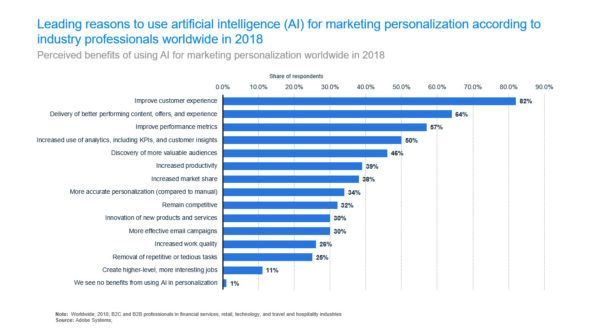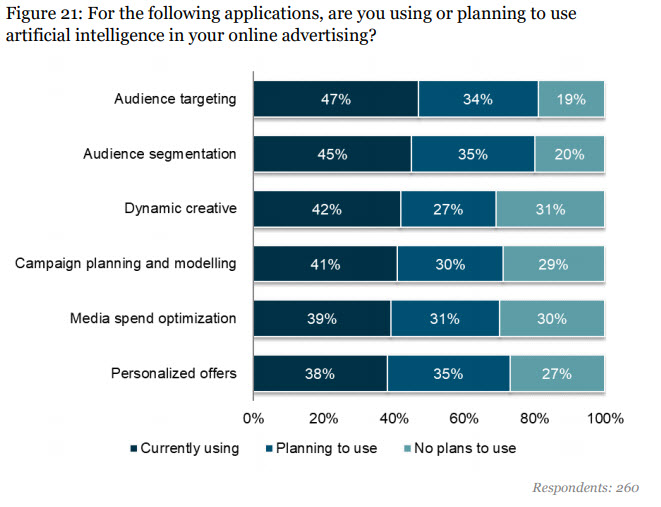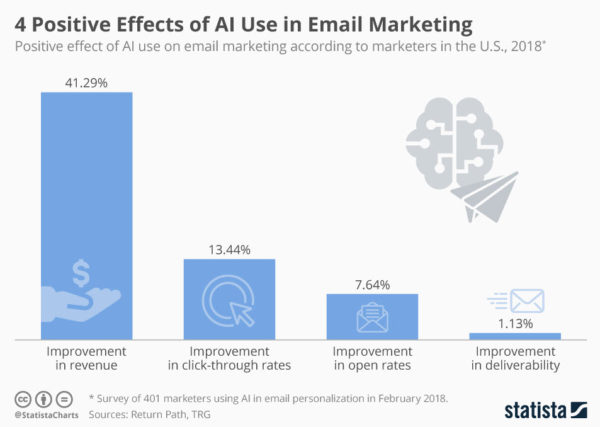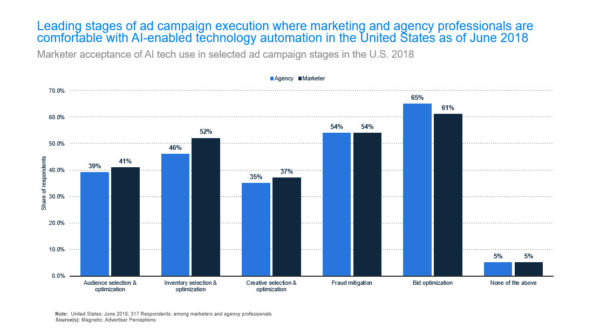- Top-performing companies are more than twice as likely to be using AI for marketing (28% vs. 12%) according to Adobe’s latest Digital Intelligence Briefing.
- Retailers are investing $5.9B this year in AI-based marketing and customer service solutions to improve shoppers’ buying experiences according to IDC.
- Financial Services marketers lead all other industries in AI application adoption, with 37% currently using them today.
- Sales and Marketing teams most often collaborate using Configure-Price-Quote (CPQ) and Marketing Automation AI-based applications, with sales leaders predicting AI adoption will increase 155% across sales teams in two years.
Artificial Intelligence enables marketers to understand sales cycles better, correlating their strategies and spending to sales results. AI-driven insights are also helping to break down data silos so marketing and sales can collaborate more on deals. Marketing is more analytics and quant-driven than ever before with the best CMOs knowing which metrics and KPIs to track and why they fluctuate.
The bottom line is that machine learning and AI are the technologies CMOs and their teams need to excel today. The best CMOs balance the quant-intensive nature of running marketing with qualitative factors that make a company’s brand and customer experience unique. With greater insight into how prospects make decisions when, where, and how to buy, CMOs are bringing a new level of intensity into driving outcomes. An example of this can be seen from the recent Forbes Insights and Quantcast research, Lessons of 21st-Century Brands Modern Brands & AI Report (17 pp., PDF, free, opt-in). The study found that AI enables marketers to increase sales (52%), increase in customer retention (51%), and succeed at new product launches (49%). AI is making solid contributions to improving lead quality, persona development, segmentation, pricing, and service.
The following ten charts provide insights into how AI is transforming marketing:
- 21% of sales leaders rely on AI-based applications today, with the majority collaborating with marketing teams sharing these applications. Sales leaders predict that their use of AI will increase 155% in the next two years. Sales leaders predict AI will reach critical mass by 2020 when 54% expect to be using these technologies. Marketing and sales are relying on AI-based marketing automation, configure-price-quote (CPQ), and intelligent selling systems to increase revenue and profit growth significantly in the next two years. Source: Salesforce Research, State of Sales, 3rd edition. (58 pp., PDF, free, opt-in).
- AI sees the most significant adoption by marketers working in $500M to $1B companies, with conversational AI for customer service is the most dominant. Businesses with between $500M to $1B lead all other revenue categories in the number and depth of AI adoption use cases. Just over 52% of small businesses with sales of $25M or less are using AI for predictive analytics for customer insights. It’s interesting to note that small companies are the leaders in AI spending, at 38.1%, to improve marketing ROI by optimizing marketing content and timing. Source: The CMO Survey: Highlights and Insights Report, February 2019. Duke University, Deloitte and American Marketing Association. (71 pp., PDF, free, no opt-in).
- 22% of marketers currently are using AI-based applications with an additional 57% planning to use in the next two years. There are nine dominant use cases marketers are concentrating on today, ranging from personalized channel experiences to programmatic advertising and media buying to predictive customer journeys and real-time next best offers. Source: Salesforce’s State of Marketing Study, 5th edition
- Content personalization and predictive analytics from customer insights are the two areas CMOs most prioritize AI spending today. The CMO study found that B2B service companies are the top user of AI for content personalization (62.2%) and B2B product companies use AI for augmented and virtual reality, facial recognition and visual search more than any other business types. Source: CMOs’ Top Uses For AI: Personalization and Predictive Analytics. Marketing Charts. March 14, 2019
- 45% of retailers are either planning to or have already implemented AI to improve multichannel customer engagement as a core part of their marketing mix. Reflecting how dependent retailers are on supply chains, 37% of retailers are investing in AI today to improve supply chain logistics, supply chain management, and forecasting (37%). Source: AI and Machine Learning use cases in the retail industry worldwide as of 2019, Statista.
- Personalizing the overall customer journey and driving next-best offers in real-time are the two most common ways marketing leaders are using AI today, according to Salesforce. Improving customer segmentation, improving advertising and media buying, and personalizing channel experiences are the next fastest-growing areas of AI adoption in marketing today. Source: Salesforce’s State of Marketing Study, 5th edition
- 82% of marketing leaders say improving customer experience is the leading factor in their decision to adopt AI. The timing and delivery of content, offers, and contextually relevant experiences are second (67%), and improving performance metrics is third at 57%. Source: Leading reasons to use artificial intelligence (AI) for marketing personalization according to industry professionals worldwide in 2018, Statista.
- 81% of marketers are either planning to or are using AI in audience targeting this year. 80% are currently using or planning to use AI for audience segmentation. EConsultancy’s study found marketers are enthusiastic about AI’s potential to increase marketing effectiveness and track progress. 88% of marketers interviewed say AI will enable them t be more effective in getting to their goals. Source: Dream vs. Reality: The State of Consumer First and Omnichannel Marketing. EConsultancy (36 pp., PDF, free, no opt-in).
- Over 41% of marketers say AI is enabling them to generate higher revenues from e-mail marketing. They also see an over 13% improvement in click-thru rates and 7.64% improvement in open rates. Source: 4 Positive Effects of AI Use in Email Marketing, Statista (infographic), March 1, 2019.
- Marketers and agencies are most comfortable with AI-enabled bid optimization for media buying, followed by fraud mitigation. Marketers and their agencies differ on ad inventory selection and optimization, with marketing teams often opting to use their analytics and reporting instead of relying on agency AI methods. Source: Share of marketing and agency professionals who are comfortable with AI-enabled technology automated handling of their campaigns in the United States as of June 2018, Statista.

